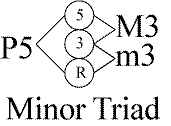Minor Triads:
What Makes a Chord Minor?
Minor triads in root position consist of an interval of a third from the root note to the "third," or middle note, and another interval of a third from the middle note ("third") to the top note, called the "fifth."
The other interval at play in a triad is the distance from the "root" to the "fifth," which is an interval of a fifth.
Thirds
An interval of a third can be qualified as either major or minor.
A major third is four half steps, and a minor third is three half steps.
An interval of a "perfect" fifth is seven half steps.
So What Makes A Triad "Minor"?
A minor triad in root position (the root being the lowest note) is made up of an interval of aminor third from the "root" to the "third," and another interval of a major third from the "third" to the "fifth."
In the chart below the intervals are represented:
Major third = M3
Minor third = m3
Perfect fifth = P5

Dig A Little Deeper...More About Chords...
Start Playing Piano Today With the Piano Guide Quick Start Course!
Easy to follow, step by step lessons designed for adult beginners. The next best thing to private lessons!
What You'll Learn:
- Notes on the piano/keyboard
- Proper fingering
- C major scale
- Chords
- How to read music
- And much more!
Video lessons - watch as I play everything for you
Downloadable pdf text and mp3 audio files


